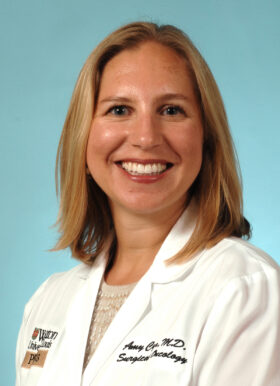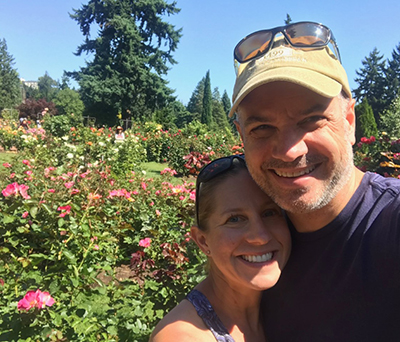Amy Cyr, MD

Amy Cyr, MD, is a surgeon who specializes in hereditary breast cancer risk, breast imaging and breast health.
What happened in the course of schooling to influence you to choose your specialty?
During residency I tried desperately to like any specialty besides surgery. But despite the long hours required for surgical residents at that time, I found the operating room was the place I wanted to be.
What drew you to breast health?
In the beginning of my career I was in practice as a general surgeon. I enjoyed the tangible result of fixing a patient and moving on to help the next patient – usually never seeing them again. But over time I realized I really liked getting to know my patients and wanted to follow them long-term. Breast surgery allows me to address a patient’s acute health problems, and at the same time be there for her in the years to come. That’s what I really like.
What brought you to Washington University?
When I decided I wanted to specialize in breast surgery, I realized I needed additional training to be really good at it. I needed to learn all the nuances of being a breast surgeon, the options available for my patients, as well as gain an understanding of hereditary cancer.
I came to Washington University for my fellowship in breast surgery. My intention was to stay one year for my fellowship and move on – that was over 10 years ago. After my fellowship, I accepted the position here because I really liked the environment of Washington University.

Which aspect of your practice is most interesting?
The most interesting aspect in my practice is all of the changes in genetics. My practice focuses on women who are at high-risk for developing breast cancer based on genetic assessment and family histories.
Some women actually have known genetic mutations that put them at a high-risk for cancer. Some women have other personal factors that put them at a higher risk. What I do is figure out how high-risk they are and determine a screening program for them.
For instance, should they be having breast MRI in addition to mammograms? Should they be seen more often? Some women are offered treatment to try to reduce their breast cancer risk.
The field of cancer genetics is changing rapidly and we are offering genetic testing to many more people than we have previously.
Which brings us to the next question … which new developments in your field are you most excited about?
The growth in cancer genetics is incredibly exciting. As recently as a couple years ago we were only testing for a few cancer genes, and now there are dozens of genes we know about. It is exciting to know that we are so much further advanced because what we know about genetics has changed so much in the past 10 years.
With genetic testing we can identify people who are at a high-risk for cancer, and can take steps to reduce their cancer risk. This includes earlier screening to hopefully prevent disease or at least catch it earlier when it is most treatable. Genetic testing results may even impact a woman’s family members or her decision to have children.
What is the first step in determining if a woman is at high-risk for developing cancer?
A woman’s family medical history is the primary reason for coming to see us for a breast cancer risk assessment.
Other women may be referred to us by their physicians if they have had an abnormal breast biopsy. While it may not be cancer now, it might mean they are at higher risk for developing breast cancer in the future.
We have tools that can use all of this information to help figure out a woman’s individual breast cancer risk.
Can you explain the CHEK2 gene mutation and what it means?
Years ago the cancer genes we focused on were BRCA1 and BRCA2. That is what Angelina Jolie had and to what she helped bring public awareness. We know those genes are associated with a high-risk of breast and ovarian cancer, as well as some other cancers.
In addition to BRCA1 and BRCA2, we are now testing for dozens of cancer genes and CHEK2 is one of these genes.
Similar to BRCA, CHEK2 is a gene that is passed down from parent to child. There is a 50/50 chance of the CHEK2 gene getting passed to her baby with every pregnancy from a man or woman who has the gene. CHEK2 gene primarily increases the risk of breast and colorectal cancer.
However, there are multiple ways that CHEK2 can be abnormal. This means that a woman who has an abnormal CHEK2 gene, might not carry as high a cancer risk as someone with a different CHEK2 abnormality. This is why it is important to see a specialist who understands that nuance and can counsel patients to determine the necessary screening.
For women who have a CHEK2 mutation that puts them in a high-risk category of having breast cancer, we typically recommend more frequent breast screening starting at a younger age and increased colorectal screening as well.
What if the father has had breast cancer?
A lot of people ask about male relatives and how important they are when it comes to family history. Because it is unusual for a man to have breast cancer (only 1-2% of breast cancers occur in men), any man with breast cancer should automatically undergo genetic testing. Any abnormal gene can be passed down equally from mom or dad. Knowing the cancer history of the men in the family and knowing the father’s family history are equally important.
Can you explain genetic counseling for women who are high-risk?
We use genetic counseling to obtain a thorough cancer history. Not only are we looking for breast cancers in the family, but we are looking for other cancers as well.
For instance, the BRCA genes are associated with ovarian cancer. There are other breast cancer genes that are also associated with colon cancer or melanoma or pancreatic cancer. We look at family history that is suspicious for a specific gene that may have contributed to the cancer risk – and then offer testing for that specific gene, usually as part of a panel of genes we test for. If there is a known mutation in the family, we want to make sure all the other family members who are at risk are informed and get tested.
Genetic counseling appointments last about an hour and consist of in-depth conversation with the patient. I work with one of our genetic counselors here in the clinic — she assists me in seeing patients and making decisions about genetic testing.
What is the next step after genetic testing?
If someone tests positive for a cancer causing gene, the next steps really depend on what that gene is. For instance, we know a lot about the BRCA genes. We will tell our patient, “OK, if you have the BRCA1 mutation, your lifetime risk of breast cancer is high and your lifetime risk of ovarian is also high.”
We can offer increased surveillance and screening starting at a younger age. Some women opt for a prophylactic surgery to reduce their cancer risk (removing breasts or ovaries before they have cancer). This is especially successful for ovarian cancer because there is no reliable screening test for ovarian cancer and it is really difficult to catch early.
For women with BRCA genes, we typically recommend they have their ovaries removed when they are finished having children. Otherwise, it depends on the gene. Some genes are associated with high-risk of colon cancer, so we might start colon cancer screening earlier.
There is a team of specialists here at Washington University (genetic counselors, breast surgeons, gynecologists, gastroenterologists and colorectal surgeons) who work together to determine what types of screening and preventative measures are needed for these hereditary cancers — and to help the patient make informed decisions.
What is the best way to communicate genetic test results to family members?
The best way is still to be determined. I have patients who say “someone in my family has the BRCA gene.” But that patient might not have a copy of that family member’s medical records. This leads to a lot of misinformation and miscommunication about genetic test results – because not all findings on those tests are actually associated with increased cancer risk.
I always give my patients a copy of their test results — ideally they need to give a copy of those results to any family member who could also carry that mutation. The easiest way is to take a photo of those results with your phone, and text or email them to family members. The family members will then have an accurate and detailed report to show their doctors.
Where are you from?
I am from Omaha, Nebraska. I’ve lived on both coasts, but the Midwest always brings me back. St. Louis is a lot like Omaha, but on a bigger scale. I moved here in 2009. I still have family back in Nebraska.
What is a must-see for someone visiting Omaha?
The College World Series is huge for Omaha. Even if you don’t enjoy baseball, it really is a fun atmosphere. I grew up going to those games. There is just something about college baseball – the whole town gets behind it. There is spirit to it that you don’t see as much with professional sports. But the College World Series is only a couple weeks in June every year.
Omaha also has a phenomenal zoo — the Omaha Henry Doorly Zoo. It is one of the best zoos in the country. They have incredible exhibits: a desert habitat, a swamp nocturnal animal habitat, and a two-story indoor rainforest. It is absolutely fantastic. We go to the zoo every time we are back in Omaha.
I know St. Louis has a fantastic zoo as well — and it is free (the Omaha Zoo is not!)
Which particular award or achievement is most gratifying?
Any time a patient thanks me for taking the time to make her feel comfortable and informed– that makes my day. Ultimately those little daily interactions are what I enjoy the most and make me feel good about doing my job.
What is the best advice you’ve received?
There are so many pieces of advice I’ve gotten over the years, I’m not sure I can pick out one. It is not really advice, as much as a reminder that life is short. I try to remember that and let it guide my interactions with people.
You can’t live every day as though it were your last, or you would never leave the house to take out the garbage! But it is important to remember the legacy you leave behind is about interactions with people.
If you weren’t a doctor, what would you like to be doing?
I am a freelance medical writer and enjoy doing that on the side. But if supporting myself financially wasn’t an issue, I would probably be doing something creative with my hands. I love to bake, cook, garden and I’m really good at cleaning!